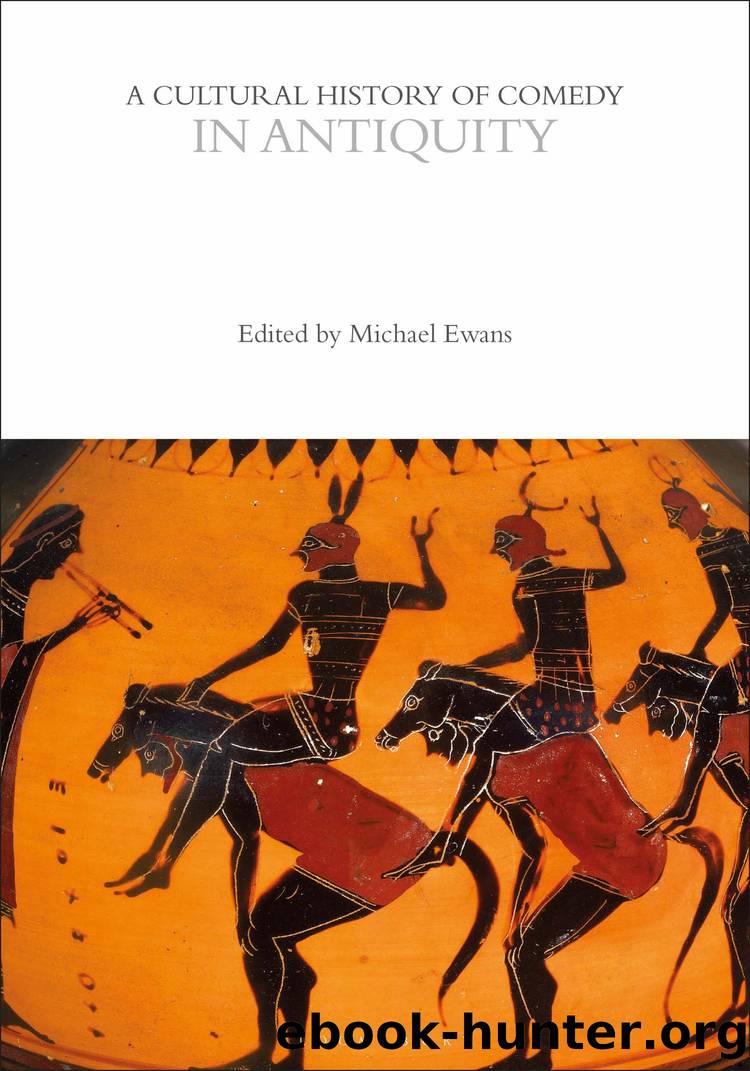A Cultural History of Comedy in Antiquity by Michael Ewans;

Author:Michael Ewans; [Ewans, Michael]
Language: eng
Format: epub
ISBN: 9781350187580
Publisher: Bloomsbury UK
Published: 2020-04-14T00:00:00+00:00
EAVESDROPPING
Another way in which the bodily presence of the actor on stage is used to highlight the comedy occurs in instances of eavesdropping, where the audienceâs ability to see and be aware of the eavesdropper increases the comedy. An unusual example of eavesdropping can be found in Aristophanesâ The Womenâs Festival where the In-Law is eavesdropping on the women whilst remaining in full view of the audience. This ensures that the audience response can be influenced by the way in which the In-Law behaves. As we listen to Mica attack Euripides the sight of the In-Lawâs disguised body is a constant reminder that the audience should anticipate some defense of Euripides from him. In this way, the presence of the body increases the comic anticipation.
Menander uses eavesdropping differently and in doing so places a different emphasis on the actorâs body. In Samia instead of showing us, for example, Demeas as he overhears that the babyâs father is Moschion, Menander ensures that this action takes place offstage and the audience only learns of it when Demeas returns to the stage to talk, in direct address to the audience, about what he has seen. In this way Menander encourages the audience to imagine the scene rather than witness it. The nature of the lengthy speech and its presentation as direct address, however, suggests that Demeas may have reenacted his experience for the audience. He relates in detail what the women said and did, presumably supporting his words with actions and putting on the womenâs voices. This generates humor as we witness Demeas taking on the voice and physicality of the nurse and the servant girl before demonstrating his own nonchalant behavior: âAnd I walked out exactly as I came / To you just now, quite calmâ (Samia 263â4; Menander trans. Balme 2001: 57) after hearing that the child he thought his mistress had borne him is in fact his sonâs child (though he is mistaken as to the identity of the mother).
Eavesdropping is common in many of Plautusâ plays. In Menaechmi Plautus uses the device several times by creating an overlap between the entrance of additional characters and the link monologue being spoken by the character occupying the stage. For example, the Old Man and the Doctor enter while Menaechmus of Epidamnus is delivering a monologue (899ff.). This, combined with the case of mistaken identity examined earlier, convinces the Old Man that Menaechmus is mad and must be taken to the Doctorâs house for treatment. The humor here lies in the fact that the audience understands why Menaechmus is saying what he says and they can also understand how this appears to be madness to the Old Man. In Epidicus (104ff.) eavesdropping is used to clarify the plot for the audience as the conversation between Stratippocles and Chaeribulus clarifies the twists and turns of the plot for them. That he has to find another 40 minae is also news to Epidicus and it is likely that the humor lies in the way in which Epidicus responds to this.
Download
This site does not store any files on its server. We only index and link to content provided by other sites. Please contact the content providers to delete copyright contents if any and email us, we'll remove relevant links or contents immediately.
Kathy Andrews Collection by Kathy Andrews(11432)
The remains of the day by Kazuo Ishiguro(8502)
Paper Towns by Green John(4866)
Spare by Prince Harry The Duke of Sussex(4854)
Industrial Automation from Scratch: A hands-on guide to using sensors, actuators, PLCs, HMIs, and SCADA to automate industrial processes by Olushola Akande(4706)
The Body: A Guide for Occupants by Bill Bryson(4677)
Machine Learning at Scale with H2O by Gregory Keys | David Whiting(3762)
Be in a Treehouse by Pete Nelson(3702)
Harry Potter and the Goblet Of Fire by J.K. Rowling(3643)
Never by Ken Follett(3594)
Goodbye Paradise(3506)
The Remains of the Day by Kazuo Ishiguro(3173)
Into Thin Air by Jon Krakauer(3163)
The Cellar by Natasha Preston(3110)
The Genius of Japanese Carpentry by Azby Brown(3084)
Fairy Tale by Stephen King(3033)
120 Days of Sodom by Marquis de Sade(2989)
Drawing Shortcuts: Developing Quick Drawing Skills Using Today's Technology by Leggitt Jim(2947)
The Man Who Died Twice by Richard Osman(2859)
